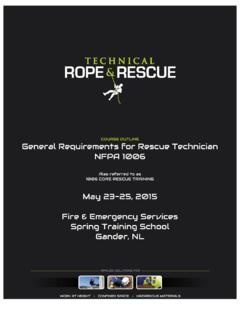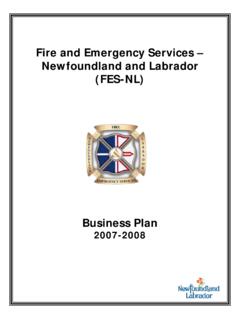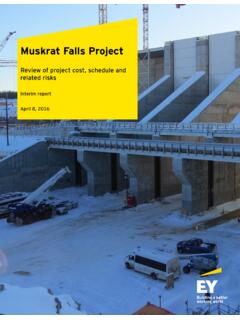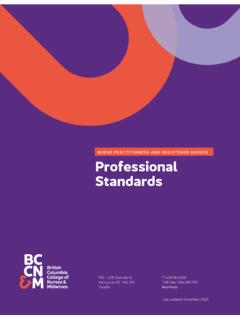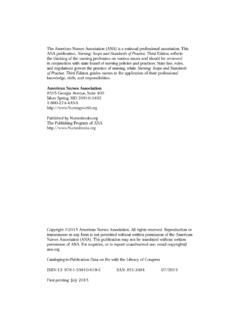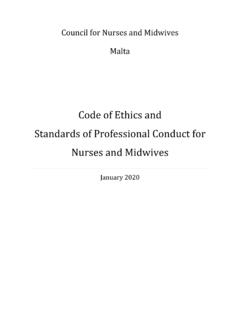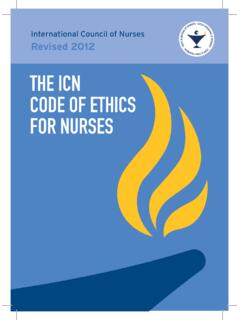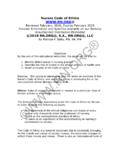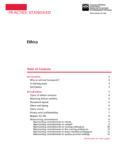Transcription of Health Professionals: Codes of Ethics
1 Health Professionals: Codes of Ethics A Background Document Prepared for the Task Force on Adverse Health Events Deborah Gregory, -1- 45. Task Force on Adverse Health Events Background Documents Volume II: Additional Reports Table of Contents Introduction Policies, Codes of Ethics and Standards of Practice of Select Health Care registered Canadian Nurses Protective Society (CNPS)..5. Licensed Practical Canadian Medical Protective Association (CMPA)..7. Appendix A: Policies, Standards and Codes of Ethics for Appendix B: Policies, Standards and Codes of Ethics for Licensed Practical Appendix C: Policies, Standards and Codes of Ethics for Appendix D: Policies, Standards and Codes of Ethics for 46. Health Professionals: Codes of Ethics Introduction Policies, Codes of Ethics and Standards of Practice of Select Health Care Professionals The following paper is a review and update, where necessary, of Codes of Ethics , standards of practice, and relevant policies of select groups of Health professionals as they relate to the management of adverse events in general and, more specifically, to the disclosure of such events.
2 Two comprehensive background papers on Canadian Health care professionals' duty to disclose adverse events were published in 20061 and 20072. In March 2008, a third review of the existing literature on the disclosure of adverse events within the Canadian Health care system was completed by Dr. Sherry Espin for the Newfoundland and Labrador Commission of Inquiry on Hormone Receptor A general overview of the relevant Codes of Ethics , standards of practice, and policies of select groups of Health professionals follows. Greater detail is presented in the attached appendices. registered Nurses Nurses' ethical practice is based on the Canadian Nurses Association's (CNA) code of Ethics for registered Nurses. It provides direction for ethical relationships, responsibilities, behaviours and decision making.
3 The code is intended to be used in combination with the professional standards, laws and regulations that guide practice. Points eight and nine under the value of Safe, Competent and Ethical Care in the code state: 8. Nurses must admit mistakes and take all necessary actions to prevent or minimize harm arising from an adverse event. 9. Nurses must strive to prevent and minimize adverse events in collaboration with colleagues on the Health care team. When adverse events occur, nurses should utilize opportunities to improve the system and prevent harm. These sections of the code do not explicitly state to whom disclosure or admission of a mistake should be made. The terms mistakes, harm and adverse event are not defined in the 2002 version of the code of Ethics .
4 Most of the provincial and territorial nurses' associations, including Association of registered Nurses of Newfoundland and Labrador, adopted the 2002 code of Ethics and integrated it into their standards of practice including the (See Appendix A). In the jurisdictions where the code was not adopted, other provisions relating to taking responsibility for errors or the relationship of trust between a nurse and a patient suggested a similar duty to admit mistakes. -3- 47. Task Force on Adverse Health Events Background Documents Volume II: Additional Reports In 2003, CNA issued a Position Statement on Patient The CNA's position on disclosure provided that Patients have a right to know when an adverse event has occurred in their care and to have appropriate treatment to address the problem as far as possible.
5 When such an event results in injury or even death, there must be open and honest communication with the patient or the family as soon as possible. The implementation of clear agency policies on the reporting of adverse events and near misses, and on disclosure of adverse events to the patient and family, are necessary to support good clinical practice and to the overall improvement of patient safety in the system. Noteworthy is the fact that nurses have taken the following position: Whistleblowing legislation should be enacted in all jurisdictions so that, after all avenues of addressing the problem have been tried, nurses who speak out publicly in good faith can be protected from reprisals. The code of Ethics undergoes periodic revisions.
6 The latest version was released in June 2008 after a three-year revision process. It provides a definition of adverse events, although the terms harm and mistakes remain undefined. Adverse events are defined as unexpected, undesirable incidents resulting in injury or death that are directly associated with the process of providing Health care or Health services to a person receiving care. 5. Point five under the value of Providing Safe, Compassionate, Competent and Ethical Care in the revised Canadian Nurses Association's (CNA) code of Ethics for registered Nurses states: 5. Nurses admit mistakes* and take all necessary actions to prevent or minimize harm arising from an adverse event. They work with others to reduce the potential for future risks and preventable harm.
7 *The code of Ethics encourages nurses to be aware of the provincial and territorial legislation and nursing practice standards that may include direction regarding disclosure and reporting, and that provide further clarity on whether there is a clear risk of harm. The code of Ethics provides guidance for nurses in the event a nurse encounters a situation where harm is underway or there is a clear risk of imminent harm. The code suggests that immediate steps should be taken to protect the safety and dignity of the persons receiving care. Examples of appropriate immediate steps in cases of actual or imminent harm include, but are not limited to, speaking up if a potential error in drug calculation is detected, questioning an unclear order, intervening to prevent unsafe restraint practices, protecting patients when a colleague's performance appears to be impaired for any reason, or interfering with a serious breach of confidentiality involving people with sexually transmitted infections.
8 -4- 48. Health Professionals: Codes of Ethics In the event nurses encounter situations where harm is not imminent but there is potential for harm, they are encouraged to work to resolve the problem as directly as possible in ways that are consistent with the good of all parties. Nurses are encouraged to review relevant statements in the code of Ethics for registered Nurses and other relevant standards, legislation, ethical guidelines, policies and procedures for reporting incidents or suspected incompetent or unethical care, including any legally reportable offence. In February 2008, the Association of registered Nurses of Newfoundland and Labrador released a Position Statement on registered Nurses' professional Duty to Address Unsafe and Unethical The duty to identify and address unsafe and unethical situations is a professional , ethical, and legal responsibility arising out of the RN's obligation to protect clients from harm and to uphold the integrity of the nursing profession.
9 All registered nurses are responsible to provide leadership in the identification and resolution of unsafe and unethical situations that adversely affect or could affect the quality of client The position statement provides examples of potential unsafe and unethical situations grouped in two categories. The first are concerns regarding the practice or behaviour of another Health professional or individual in the workplace. The second are concerns regarding the workplace. A framework that reflects the process registered nurses need to follow when addressing such situations is presented and discussed. The framework consists of the following steps: 1. Verify the concern 2. Take appropriate action 3. Make a report 4.
10 Document the concern 5. Follow-up if the concern (s) is unresolved. 8. Canadian Nurses Protective Society (CNPS). Health care organizations in Canada and their employed Health care providers generally have liability insurance coverage provided through provincial or regional insurance reciprocals or commercial insurers. The Canadian Nurses Protective Society (CNPS) is a non-profit society owned and operated by nurses for nurses. It offers legal liability protection related to nursing practice. In 2005, CNPS issued an information sheet stating that disclosure to patients is appropriate based on the patient's right to know their own Health -5- 49. Task Force on Adverse Health Events Background Documents Volume II: Additional Reports The fear of professional disciplinary proceedings is a potential obstacle to disclosure of adverse events.
